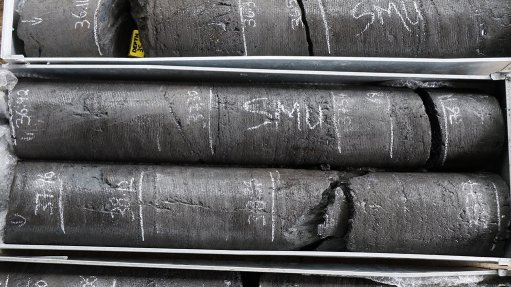Minerals Council promises 'robust' discussion with Mantashe over draft Bill


Minerals Council South Africa CEO Mzila Mthenjane, Minerals Council president Paul Dunne and Mineral and Petroleum Resources Minister Gwede Mantashe
To provide additional input into the Department of Mineral and Petroleum Resources’ (DMPR’s) draft Mineral Resources Development Bill (MRDB), the Minerals Council South Africa is seeking to further engage, through “robust” conversation, Mineral and Petroleum Resources Minister Gwede Mantashe.
In its first response to the gazetting of the MRDB for public comment, the Minerals Council highlighted, on May 27, that the Bill did not reflect past inputs from the council, presenting legislation that was “not altogether optimal”.
Speaking at the Minerals Council’s 135th AGM, on May 28, newly elected permanent Minerals Council president Paul Dunne said the draft MRDB was important on two counts: whether it contributed to an improved investment climate and whether or not it was employment positive.
He added that the council’s considered answer to both questions was “no, it does not” and therefore, as it stood, the MRDB “cannot go unchallenged”.
Dunne added though, that it was not his intention to “sandbag” Mantashe with a long list of technical and substantive reasons as to why the MRDB was problematic in its current form.
“What we were exposed to in our two engagements was very high level and we were not given any access to the underlying wording of what we were shown and how it was being amended,” said Minerals Council South Africa CEO Mzila Mthenjane, on May 27.
Dunne highlighted that being a considered and professional advocacy body that was representative of at least 99% of South Africa’s mining industry, the Minerals Council’s submission towards the draft MRDB would be made public when the “right time comes”.
“When we talk of the revision of the [MRDB] . . . [that] it doesn’t reflect the Minerals Council’s input – I don’t know about that,” said Mantashe, adding that it was quite important, therefore, to appreciate the fact that the revision of the MRDB was a discussion that is “open”.
“Raise your issues [but] don’t make subtle attacks . . . talk to us,” he said of potential looming court battles over the matter.
However, Mantashe was insistent, raising the point on numerous occasions, that the MRDB would not remove “provision for black economic empowerment”.
“If the Minerals Council thinks that their comments are not being taken into account, they [now] have another opportunity to register their comments. Those comments will effect change, others will not because we receive a whole range of comments . . . some will be taken into account, others will fall off, [while with] others – we are going to fight it out,” he stated.
DIFFICULT TIMES
Dunne noted that South Africa’s mining industry was “undoubtedly going through a difficult time”, with mining company-derived tax being halved to R43.6-billion, royalties shrinking to R16-billion from R25-billion, and the industry’s contribution to GDP reducing from 6.3% in 2023, to 6.1%.
“Unemployment and a lack of economic opportunity inflicts a terrible pain and cost to society . . . Our sector needs to be prioritised from a policy point of view, such that South Africa remains an attractive destination for investment and exploration with a distinct link to job creation and job preservation,” he said.
Dunne added that while the South African mining industry could not control global commodity prices, South African mines could invest through commodity cycles “if, and only if, the right policies and investment climate are in place”.
“The Minister knows us very well. We're very tough. And Minister, we are coming,” said Dunne of the Minerals Council’s future engagements on the MRDB.
ARTISANAL, SMALL-SCALE MINING
Returning to the draft MRDB, Mantashe said it was important for the mining industry to take notice of provision in the MRDB concerning artisanal and small-scale mining (ASM).
“ASM talks to the nature of this industry,” he said.
“The only problem with big mining companies is that their work must fit their cost structure. And because it [sometimes] doesn’t fit their cost structure, they leave marginal deposits in the ground. Mineworkers know that marginal deposits have been left [and], they come back as illegal miners,” Mantashe explained.
Therefore, he said the promotion of ASM was imperative for the mining industry to enhance “that section, so that we go back and deal with those marginal deposits that are left there”.
Article Enquiry
Email Article
Save Article
Feedback
To advertise email advertising@creamermedia.co.za or click here
Announcements
What's On
Subscribe to improve your user experience...
Option 1 (equivalent of R125 a month):
Receive a weekly copy of Creamer Media's Engineering News & Mining Weekly magazine
(print copy for those in South Africa and e-magazine for those outside of South Africa)
Receive daily email newsletters
Access to full search results
Access archive of magazine back copies
Access to Projects in Progress
Access to ONE Research Report of your choice in PDF format
Option 2 (equivalent of R375 a month):
All benefits from Option 1
PLUS
Access to Creamer Media's Research Channel Africa for ALL Research Reports, in PDF format, on various industrial and mining sectors
including Electricity; Water; Energy Transition; Hydrogen; Roads, Rail and Ports; Coal; Gold; Platinum; Battery Metals; etc.
Already a subscriber?
Forgotten your password?
Receive weekly copy of Creamer Media's Engineering News & Mining Weekly magazine (print copy for those in South Africa and e-magazine for those outside of South Africa)
➕
Recieve daily email newsletters
➕
Access to full search results
➕
Access archive of magazine back copies
➕
Access to Projects in Progress
➕
Access to ONE Research Report of your choice in PDF format
RESEARCH CHANNEL AFRICA
R4500 (equivalent of R375 a month)
SUBSCRIBEAll benefits from Option 1
➕
Access to Creamer Media's Research Channel Africa for ALL Research Reports on various industrial and mining sectors, in PDF format, including on:
Electricity
➕
Water
➕
Energy Transition
➕
Hydrogen
➕
Roads, Rail and Ports
➕
Coal
➕
Gold
➕
Platinum
➕
Battery Metals
➕
etc.
Receive all benefits from Option 1 or Option 2 delivered to numerous people at your company
➕
Multiple User names and Passwords for simultaneous log-ins
➕
Intranet integration access to all in your organisation


















